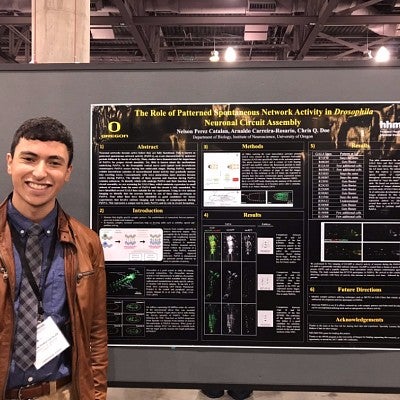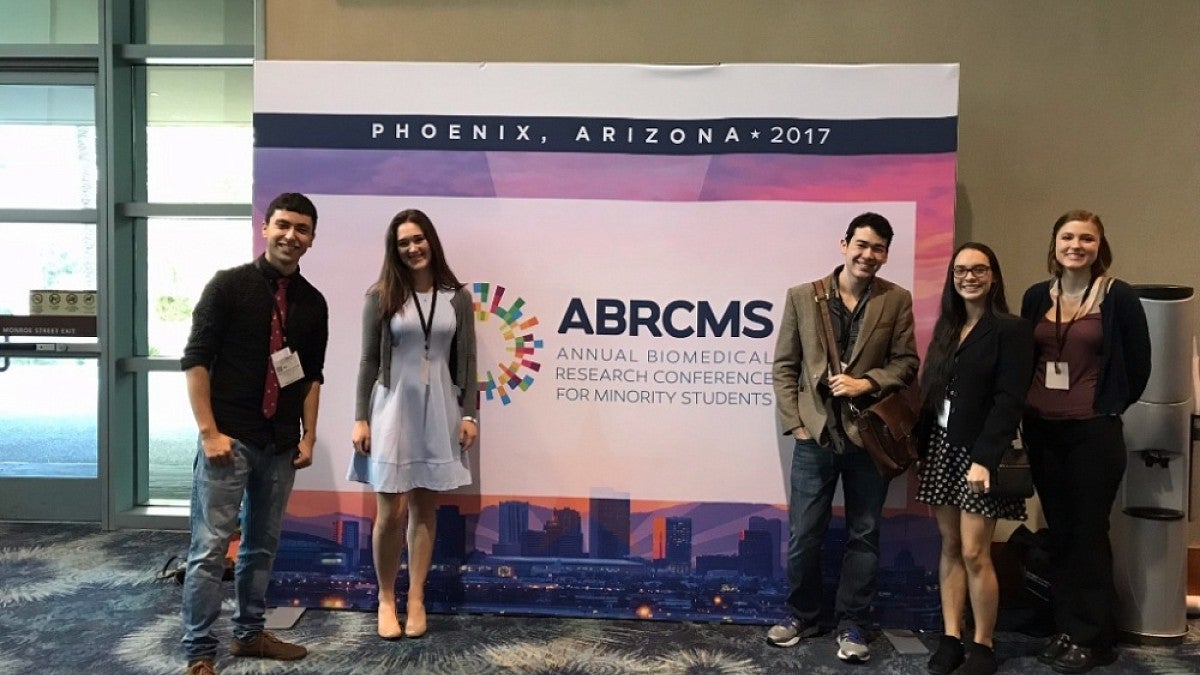Third-year Clark Honors College students Nelson Perez and Lilly Carroll were two of the hundreds of students across the nation to attend the Annual Biomedical Research Conference for Minority Students in Phoenix, Arizona, last November.
At the conference, Perez and Carroll presented posters of their research conducted in University of Oregon labs in summer 2017, and they had the opportunity to connect with other students in their field and network with representatives of potential graduate programs. Perez received an award for a poster on his neuroscience research.

The research opportunities and accolades Perez and Carroll have received stem from their own motivation to join labs early in their college experiences.
“At the end of my freshman year, I knew I needed to work a lot of hours because I needed to support myself as a student and I also wanted to find something that was more connected to what I wanted to do than my classes,” Perez said. “I went to an interview that I found through the Career Center for an entry-level lab aide.”
Perez ended up being hired for the position at a lab that worked in what at the time was his dream field, cardiology. Perez spent two terms working as a lab aide and gaining an understanding of life in a laboratory.
“The best way to start is to learn the basic process and how the lab works,” Perez advised. “Work as a lab aide, learn how to combine simple chemicals, learn how to help other people with their research, and once you help them enough, you’ll start thinking about the things you can do.”
Once Perez gained the basic skills he needed to contribute to lab research, he sought out work in neuroscience, a topic that caught his interest as he progressed through his classes. The Doe Lab hired Perez to work directly with postdoctoral students on their research because of the skills he could offer from his time as a lab aide.
Carroll found her start in lab work through a program called JUMP, for Joint Undergrad-Grad Mentorship Program, that she joined early in her freshman year.
“It was a group of undergrads working with grad students, so we would get grad students’ perspectives on how to navigate a science education and how to get involved with the community,” Carroll said.
During her sophomore year, the program passed out pamphlets of the UO labs that were hiring undergraduate lab aides.
“I looked at all of the labs and picked the one I was most interested in and emailed the principle investigator of that lab," Carroll said. "I didn’t try to sell any of my skills because I didn’t really have any. I had only taken general chemistry and biology labs, so I really didn’t have any lab experience when I got there. I think what most professors want to know about people who want to work in their lab is that they’re actually really interested in the projects that go on in their lab.”
Perez said that the experience of lab work can, at times, be more beneficial than typical classes.
“Classes sometimes don’t help because there are a lot of people in classes and a lot of competitiveness,” Perez said. “When someone is a little better than you are and gets better grades, you have a little bit of imposter syndrome, thinking that you’re not good enough to be there.”
Imposter syndrome can be a major self-deterrent from applying for the multitude of opportunities students have at the UO.
“You’re in college because you are passionate about X, Y, Z and when you pursue those passions you have more of an idea of who you are and what things you can achieve,” Perez said.
For students who are curious or concerned about joining a lab, Carroll said you shouldn't get discouraged by the job hunt.
“It took a lot of rejections from people for me to get into a lab,” she said, speaking about the 10 other professors she emailed whose labs were unavailable or who just weren't interested.
“There are a lot of resources for people who don’t know what to do,” Carroll said. “Go to the department and ask if any of the professors are interested in undergrads.”
She also cited graduate employees as a great resource on available undergraduate positions.
Perez advised students to watch out for the imposter syndrome, something that he struggled with early on.
“I thought that they were going to look at me and think I was just another kid, but all professors know what it was like to be an undergrad,” he said. “It’s big icebreaker to say, ‘Hey, I want to learn about the thing you’ve been working on for the last 30 years.’ They are very welcoming.”
Both Perez and Carroll want to have their research published in a journal during their undergraduate experience, a difficult feat for professional researchers let alone undergraduate students.
“It’s very strange to have publication for an undergrad, but it’s not impossible if you have mentors that can push and guide you,” Perez said. “I’d really like to have my name on my own paper to show prospective graduate programs.”
—By Isabella Garcia, Clark Honors College multimedia communications assistant


